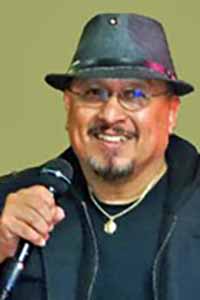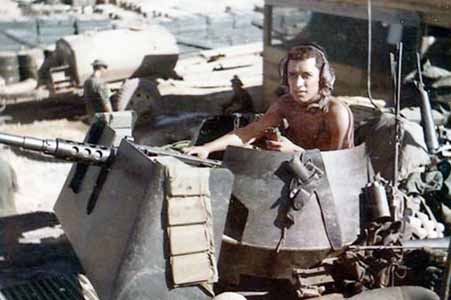Army Vietnam War Downers Grove, IL Flight date: 09/21/22
By Mark Splitstone, Honor Flight Chicago Veteran Interview Volunteer
Ronald Baltierra was born in Berwyn, Illinois in 1947, and was raised by his grandparents. He attended Reavis High School in Burbank, where he was on the varsity wrestling team all four years. He began in the 95-pound weight class, finished in the 112-pound weight class, and still holds multiple records for his victories. After graduating high school in 1966, Ron was offered wrestling scholarships to several colleges, but because his grandparents were having financial difficulties, he decided to get a job instead. He worked the midnight shift at a factory in Berwyn for two years, and by then almost all his friends were either in the military or in college. He went to his draft office in early 1968 to ask why he hadn’t been drafted, and a month later he received his draft notice. In that sense, Ron says he volunteered to be drafted, although he recently discovered a twist to the story.
Ron’s Basic Training was at Fort Leonard Wood in Missouri and then he went to Fort Polk, Louisiana for advanced infantry training. After that, he received thirty days of leave, came home, and got engaged to a girl he had been dating for four years. He flew to Vietnam in August, 1968 and landed at the air base in Long Binh during a mortar bombardment. They were hit by persistent rocket and mortar attacks during his first days in Vietnam. Ron says it was “a hell of a welcome.” He was assigned to the Ninth Division and stationed at Binh Phuoc, north of Saigon. They rarely had a full complement of men because of soldiers being killed, wounded, or transferred out.
After less than a week in Vietnam, Ron was assigned to walk point for his platoon. He says he didn’t really know what he was doing, but he was mentored by his squad leader and quickly learned what to look for. One day while they were on a patrol, his platoon was ambushed; their lieutenant and radio telephone operator (RTO) were both hit and incapacitated. Everyone was pinned down, but Ron managed to crawl to the RTO and attempted to call in artillery fire. He didn’t have experience on the radio but was able to explain their situation. The artillery fired a series of dummy rounds, and after each one, Ron corrected their fire. Eventually, they got the target right and hit it with explosives, knocking out the enemy.
After several months of walking point, Ron was given the opportunity to become a .50 caliber machine gunner on an armored personnel carrier. He liked that he could stay dryer and could sometimes sleep inside, but he missed being on the ground and in the lead, and he didn’t like being in one place all the time. He also didn’t like the frequency with which the armoured personnel carriers (APCs) seemed to hit mines.
When the platoon RTO position became available, Ron’s lieutenant strongly encouraged him to take it. Ron was reluctant because he knew RTOs had a short life expectancy because the antennas on their radios made them easy targets. Nevertheless, he took the job. In January 1969, his platoon lost an APC to a mine. Ron’s lieutenant saw the VC who had set off the mine and after pointing him out, he ran towards him. Unfortunately a new private with a grenade launcher fired his weapon and hit the lieutenant in the back. The grenade didn’t explode, and although the lieutenant was badly hurt he did survive.


Shortly thereafter, Ron was asked to be the RTO for the battalion headquarters. He was initially reluctant but was convinced to take it when he realized he’d sleep in a bed with a pillow, be able to shower daily, have three meals a day, and have a hooch maid to clean his quarters. His worst memory from this role was when a company was out on a night patrol. Ron was in contact with the platoon RTOs but realized that something didn’t make sense with where they said they were located. At 1:00 in the morning, one platoon said they spotted the enemy and requested permission to fire. The colonel was woken up, and without listening to Ron’s concerns, he told them to open fire. The speakers in the radio room, which had been turned up as loud as possible because the RTOs had been whispering, exploded with noise as the firefight began. It turned out that two groups of American soldiers were facing each other, and the resulting “friendly fire” incident resulted in eight deaths.
Ron decided that he didn’t like that job, so when he heard about the opportunity to become a sniper, he took it. The training was a grueling 21-day course, where they learned everything about the weapon, tracking, map reading, and radio usage. After graduating from the course, he sat with a buddy and they contemplated the fact that they’d have to really start killing people; in most cases those people wouldn’t even know they were being targeted before getting hit. Ron says that at first, it was difficult for him to pull the trigger, but after a couple of weeks in the field, he got used to it. When he became a sniper, he was also promoted to sergeant.
The sniper’s weapon, night scope, and silencer weighed 38 pounds, which when added to everything else he had to carry was quite a load for the 125-pound Ron. The night scope gave them an advantage at night, so almost all of their sniping occurred then in two-man teams. Ron also participated in an experimental program of sniping at night from a helicopter. The helicopter would hover over a village as he took shots at the target. As it turned out, there were too many variables to make sniping effective from a helicopter and the helicopter was too unstable to use as a platform. Ron recalls using tracers one time so he could tell where his bullets were hitting, but this alerted the villagers to what was happening and they started firing back. As the tracers came up at them, Ron’s commander ordered the pilot to leave quickly.
The Ninth Division departed South Vietnam in August of 1969, so Ron was sent home five weeks earlier than he expected. He still had seven months of enlistment left, and after visiting home, he was assigned to Fort Hood, Texas, where he participated on the Army wrestling team. This turned out to be a tumultuous time for him, as his fiancée left him, his father died, his brother was killed, and he heard that his friend and sniping partner, Gramps, was killed by friendly fire.
Ron was discharged in 1970 and returned to Chicago. He went to college on a wrestling scholarship but dropped out before graduating. He started doing construction work and then became a general contractor. Eventually, the general contracting firm that he started with another veteran became the largest minority-owned contractor in Chicago. The project he’s proudest of is the Little Village Arch (Arco de La Villita), which was recently named a Chicago landmark. He’s been married three times and has four children and four grandchildren.
Ron feels that many men were mad at the world when they were in Vietnam and brought that anger home with them. Throughout his time in the military and thereafter, Ron always tried to stay busy, in part to keep his mind off what was happening. While he was in the Army, he sometimes acted as the company barber (a skill he learned from his barber father), and also started up a fitness center. He feels that you need to keep your mind occupied and focus on achieving something. Before he retired, he focused on building his business, and now he spends a lot of time collecting information and writing about his Vietnam experiences. As part of this project, he’s reached out to his buddies from the war to get them to write their stories as well. He also acts as a service officer, working with veterans to make sure they get all the benefits they are entitled to.
Ron witnessed four separate friendly fire incidents in Vietnam and considers himself lucky to have gotten out. His mother passed away recently, and when his sister was going through her papers, she found a draft notice that his mother received and hid the year before Ron was eventually drafted. If she had given it to him when she got it, he would have been there during the Tet Offensive, and perhaps things might have turned out very differently for him. He thinks that his mom’s action might have saved his life. He also considers himself lucky because of all the relationships he built in the military.
And on a happy note, twenty-seven years after he heard that his friend and sniper partner Gramps had died, he received a phone call from a stranger. The man had trouble speaking but identified himself as Gramps. Back in 1969, Gramps had been shot in the face and shoulders five times but had somehow survived. Shortly after their phone call, Gramps and Ron, along with another sniping buddy, had a reunion in Chicago.
Thank you, Ron, for your courageous leadership in service to our country. Enjoy your well-deserved day of honor on the 105th flight of Honor Flight Chicago!


